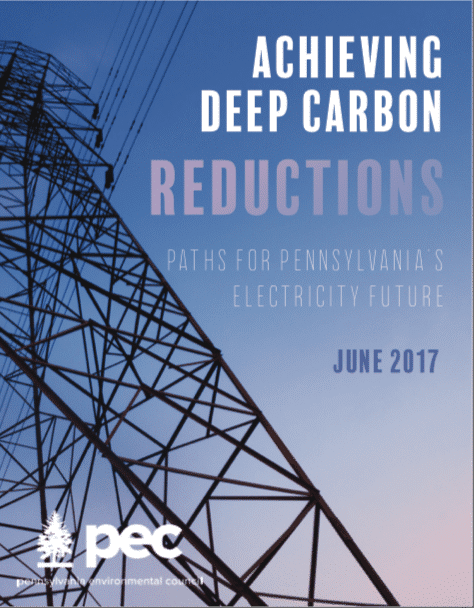
Energy production is essential to Pennsylvania’s economy. However, Pennsylvania also emits a significant amount of greenhouse gases annually, and the vast majority of these emissions are related to energy production or consumption. In 2017, production and consumption of energy accounted for nearly 90 percent of Pennsylvania’s approximately 263 million metric tons of carbon dioxide equivalent emissions, according to the PA Department of Environmental Protection.
PEC has spent years researching paths to reducing greenhouse gas emissions in Pennsylvania, and recognizes that the most effective approach will likely utilize a diversity of strategies. These include linking with the Regional Greenhouse Gas Initiative (RGGI) carbon market, adopting a Clean Energy Standard (CES), promoting energy efficiency, and supporting the development of zero-carbon energy sources. As the state moves closer to joining RGGI and implementing a carbon pricing system for electricity production – which will unlock new revenues to be invested in clean-energy innovation – it’s more important than ever to explore the full range of strategies that will empower Pennsylvania to reach its carbon-reduction goals.
CCUS can be a useful tool in the transition to a more sustainable energy future.
In addition to carbon pricing and investment in renewables, carbon capture, utilization, and storage (CCUS) can be a useful tool in the transition to a more sustainable energy future and the shift away from fossil fuels. This approach captures carbon dioxide from a point source and either injects it deep underground, where it can be stored long-term, or repurposes it.
In the last few years PEC has convened stakeholders and initiated conversations surrounding CCUS in Pennsylvania. This summer, PEC worked with the Center for Climate and Energy Solutions (C2ES) to organize a panel discussion on carbon capture.
Most recently, we created an interactive story map to help Pennsylvanians better understand the background, advantages, and potential challenges associated with CCUS. We invite you to explore and educate yourself on the issue:
To learn more about PEC’s work on deep decarbonization, visit pecpa.org/climate.

